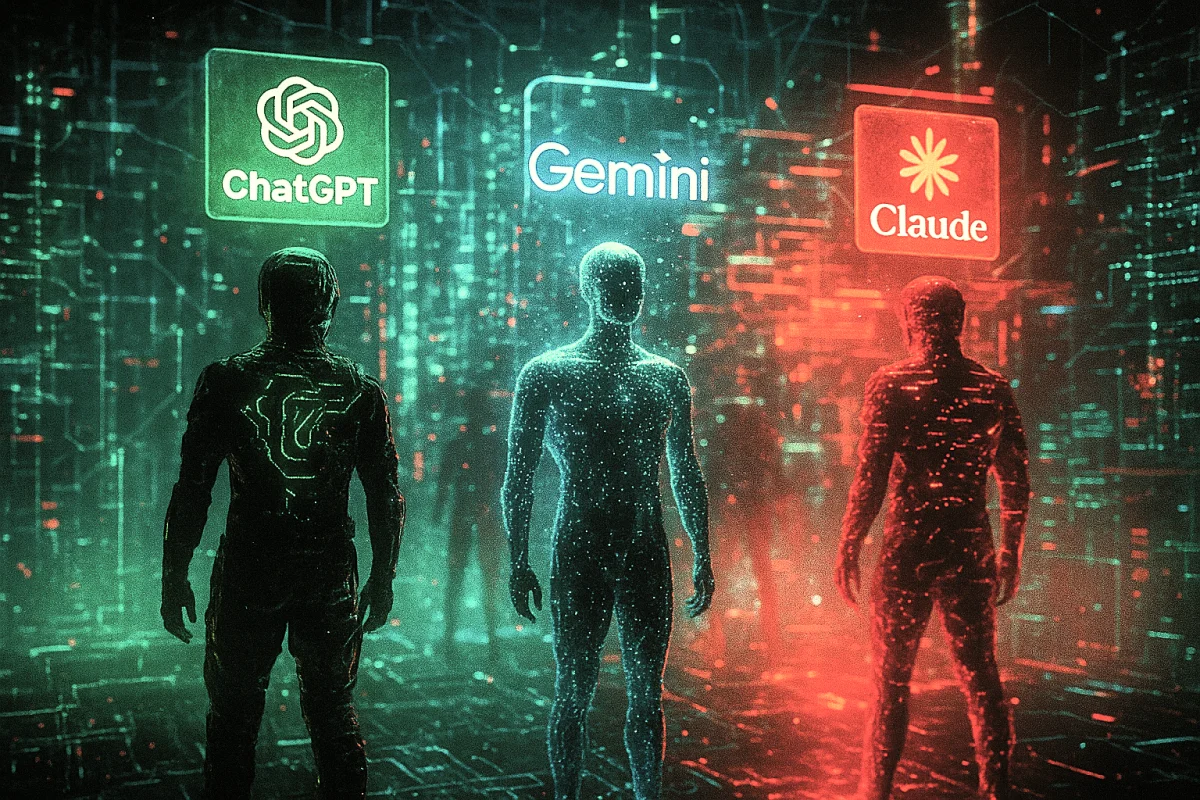ChatGPT, Gemini, and Claude: The AI Bots War
Competition in the field of artificial intelligence no longer resembles a simple “race track”—it has become a marathon where victory depends on accuracy, reliability, and user value. The three main players—ChatGPT, Gemini, and Claude—are developing generative models with different philosophies and architectures. But what advantages does each bring to businesses, developers, and everyday users? Let’s take a closer look.

Why the “Bots War” Matters
Large Language Models (LLMs) have become a universal layer that handles daily tasks: writing text, conducting research, generating code, and summarizing data. For companies, this means saving time and reducing costs; for users, it means faster, more personalized assistance. That’s why three factors matter most: speed (response time), accuracy (factual correctness), and safety (ethics, privacy).
ChatGPT: The Creative and Versatile Assistant
ChatGPT excels at thinking outside the box and generating creative ideas. It is effective in multilingual communication, adapting writing style, and producing content—from short posts to detailed scripts. For developers, it helps with translating code between languages, providing structural comments, and offering refactoring advice. For businesses, it can extend presentation content, adjust email tone, and align communication with brand voice. Its strengths include flexible tone, rich examples, and fast “idea generation.”
Gemini: The Arena of Research and Informational Precision
Gemini, powered by Google’s ecosystem, often outperforms in research and structured analysis. When references, thematic reviews, or concise briefs are required, Gemini performs as a diplomatic researcher. Its strengths lie in contextualizing information, schematic explanations, and clear outputs with tables and bullet points. Research teams value it for quickly producing “first drafts” that humans can later refine.
Claude: Ethical Standards and Safe Design
Claude stands out for its strong focus on safety and a cautious tone. Its responses are often measured, emphasizing privacy and respect for boundaries. This makes it especially appealing to organizations that need a responsible assistant in areas like law, healthcare, or corporate training. Claude’s careful style is useful when the priority is to strictly adhere to rules and avoid unnecessary risks.
Where Businesses and Users Apply Them
Companies often combine these bots: ChatGPT for ideation, Gemini for structured references, and Claude for compliance and tone control. In education, teachers design assignments and rubrics; in marketing, teams generate titles and synopses for A/B testing; developers rely on them for boilerplate code, testing, and documentation. For individuals, these bots transform daily life: rewriting email tone, editing resumes, and simplifying complex instructions.
Risks and How to Manage Them
AI bots carry two major risks: hallucinations (false facts presented confidently) and privacy concerns (handling sensitive data). The solution is the “human-in-the-loop” principle—humans verify critical decisions. Best practices include citing sources, defining clear internal policies (what data to share and what not), and using approaches like RAG (Retrieval-Augmented Generation), where the model generates answers based on verified material.
Who Wins the “War”?
The truth is, there will be no absolute winner. Leadership shifts depending on the use case: for creative brainstorming and flexibility—ChatGPT; for contextual accuracy and structure—Gemini; for compliance and a safe tone—Claude. The most effective strategy today is a hybrid approach, integrating each bot’s strengths into the workflow.
Conclusion
The “AI Bots War” ultimately benefits users: improving quality, reducing costs, and accelerating the cycle from “idea → execution.” Yet pressing the green button isn’t enough—responsible policies, source validation, and human intuition are essential. 👉 What do you think: which strength will become the decisive advantage in the future—creativity, factual accuracy, or ethical standards?
Article updated • by: Silent Cat 🐾 • 10-09-2025, 12:02
Reason for change: Correction
✍ Article Author
- Registered: 26 July 2025, 15:34




 Silent Cat 🐾
Silent Cat 🐾